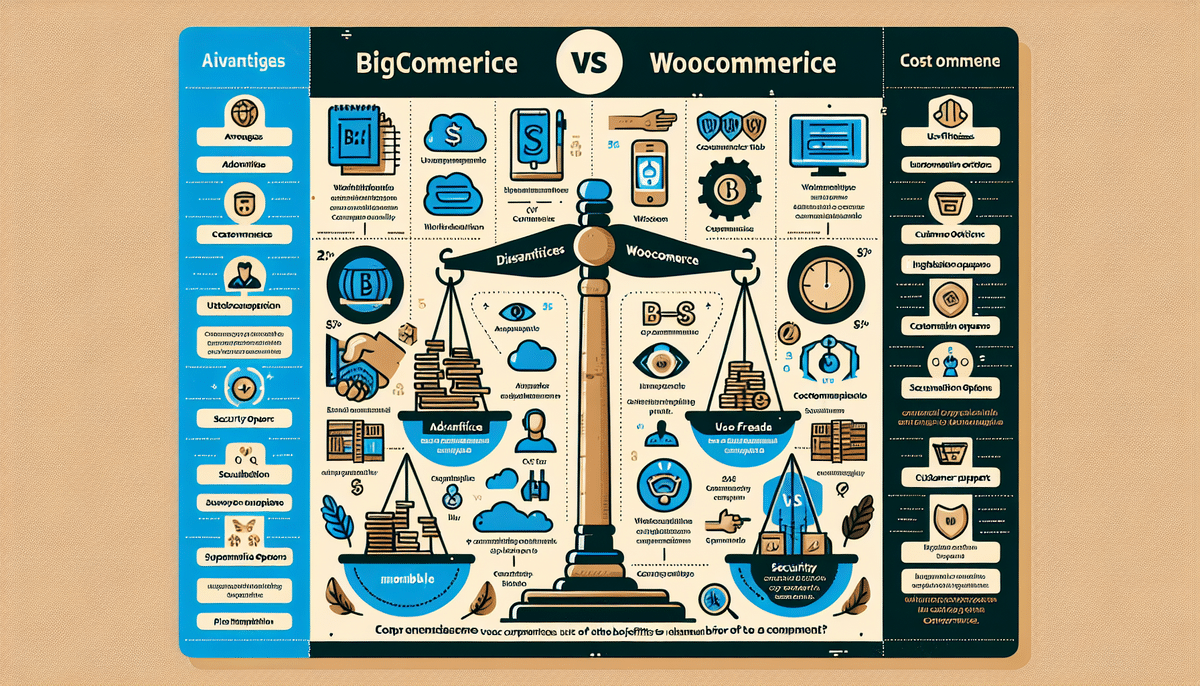WooCommerce vs BigCommerce: Comprehensive eCommerce Platform Comparison
In today's digital age, selecting the right eCommerce platform is crucial for the success of any online business. With numerous options available, businesses must carefully evaluate platforms to meet their specific needs. This article provides an in-depth comparison of two leading eCommerce platforms: WooCommerce and BigCommerce. We will explore their features, pricing, ease of use, customization options, and more to help you make an informed decision.
Understanding eCommerce Platforms
eCommerce platforms empower businesses to establish and manage online stores, offering functionalities like payment gateway integration, order management, and inventory tracking. The right platform enhances the online shopping experience, driving sales and fostering business growth.
Popular eCommerce platforms include Shopify, WooCommerce, Magento, and BigCommerce. When choosing a platform, consider factors such as budget, product catalog size, customization needs, security, and reliability to ensure optimal performance and customer satisfaction.
Overview of WooCommerce
What is WooCommerce?
WooCommerce is a free, open-source WordPress plugin with over 5 million active installations. It offers essential features like product management, order tracking, and payment gateway integration, making it a popular choice for businesses seeking flexibility and control over their online stores.
Key Features of WooCommerce
- Open-source and free to use
- Customizable themes and templates
- Flexible shipping options
- Built-in marketing and SEO tools
- Extensive library of third-party extensions
WooCommerce's vast library of extensions allows businesses to add functionalities such as advanced shipping, subscription management, and product recommendations. The platform's strong community support provides access to resources like documentation, forums, and tutorials, facilitating easier store management.
Overview of BigCommerce
What is BigCommerce?
BigCommerce is a cloud-based eCommerce platform offering an all-in-one solution for creating and managing online stores. Known for its scalability and reliability, BigCommerce caters to businesses of all sizes, providing an easy-to-use interface and a comprehensive set of out-of-the-box features.
Key Features of BigCommerce
- User-friendly interface
- Scalable and reliable infrastructure
- Mobile-responsive themes and templates
- Integrated payment gateway options
- Advanced inventory tracking
- Comprehensive product management tools
BigCommerce also offers built-in SEO tools, customizable meta titles and descriptions, canonical tags, and automatic sitemap generation. These features enhance the store's visibility on search engines, driving more traffic and increasing sales.
Comparative Analysis: WooCommerce vs BigCommerce
Pricing Structures
Choosing between WooCommerce and BigCommerce often comes down to budget considerations:
- WooCommerce: Free to use, but requires additional expenses for hosting, domain names, and SSL certificates. Premium extensions and themes may also incur costs.
- BigCommerce: Offers tiered pricing plans ranging from $29.95 to $299.95 per month, inclusive of hosting and access to all features. These plans scale based on business needs and transaction volumes.
While WooCommerce may appear more cost-effective initially, ongoing maintenance and extension costs can add up. BigCommerce's all-inclusive pricing provides predictability and reduces the need for additional expenditures.
Ease of Use
Ease of use is a critical factor for businesses without extensive technical expertise:
- WooCommerce: Requires some technical knowledge to set up and manage. Users need to handle hosting, security, and updates independently.
- BigCommerce: Provides a user-friendly interface with minimal technical setup, making it ideal for businesses seeking a hassle-free solution.
However, WooCommerce offers greater flexibility and customization options, which can be advantageous for businesses with specific design and functionality requirements.
Customization and Flexibility
Customization capabilities vary between the two platforms:
- WooCommerce: Highly customizable with access to thousands of themes and plugins. Businesses can tailor their stores extensively to match their brand and customer experience needs.
- BigCommerce: Offers a range of customizable templates and built-in features, but with more limitations compared to WooCommerce. Advanced customizations may require developer assistance.
WooCommerce's open-source nature allows for deeper modifications, whereas BigCommerce provides a more standardized approach with essential features readily available.
SEO Capabilities
Both platforms offer robust SEO tools, but their approaches differ:
- WooCommerce: Provides extensive SEO customization options, including SEO-friendly URLs, meta tags, and integration with popular SEO plugins like Yoast SEO.
- BigCommerce: Includes built-in SEO features such as customizable meta titles and descriptions, canonical tags, and automatic sitemap generation. Additionally, BigCommerce ensures fast loading times and mobile optimization, which are critical for SEO.
WooCommerce may offer more granular control for SEO enthusiasts, while BigCommerce provides essential SEO tools out of the box.
Payment Gateway Options
Payment processing is a core component of any eCommerce platform:
- WooCommerce: Supports a wide range of payment gateways through extensions, including PayPal, Stripe, and Authorize.net. This flexibility allows businesses to cater to diverse customer preferences.
- BigCommerce: Offers multiple built-in payment gateways and streamlined integration, facilitating a smoother checkout experience.
WooCommerce's extensive payment gateway extensions provide more options for customization based on target markets, whereas BigCommerce focuses on simplifying the payment process with readily available integrations.
Security Features
Ensuring the security of customer data is paramount:
- WooCommerce: Relies on the security of the chosen hosting provider. Users must manage SSL certificates, PCI compliance, and implement security measures themselves or through plugins.
- BigCommerce: Provides robust security features, including SSL certificates, PCI compliance, and automatic security updates. BigCommerce also has a dedicated security team monitoring for threats.
BigCommerce offers a more comprehensive security package out of the box, reducing the burden on businesses to manage security aspects independently.
Customer Support and Resources
Reliable customer support can significantly impact the management of an online store:
- WooCommerce: Offers support through extensive documentation, community forums, and email support. However, personalized support may require purchasing from third-party providers.
- BigCommerce: Provides 24/7 customer support via phone, email, and live chat. Their comprehensive support ensures businesses can receive immediate assistance when needed.
BigCommerce's dedicated support is advantageous for businesses that require constant assistance, while WooCommerce relies more on community-driven support structures.
Target Audience: Which Platform Fits Your Business?
WooCommerce for Small to Medium-Sized Businesses
WooCommerce is ideal for small to medium-sized businesses that seek extensive customization and have the technical resources to manage their store's backend. Its flexibility allows for tailored solutions that can grow with the business.
BigCommerce for Large Enterprises
BigCommerce caters well to large enterprises requiring a scalable, secure, and robust eCommerce platform. Its all-in-one solution reduces the need for extensive technical management, allowing businesses to focus on growth and customer engagement.
Final Considerations: Making the Right Choice
Choosing between WooCommerce and BigCommerce involves evaluating your business's specific needs, technical capabilities, and budget:
- Choose WooCommerce if: You need high customization, have technical expertise, and prefer a cost-effective solution with scalability through extensions.
- Choose BigCommerce if: You require a comprehensive, secure, and scalable platform with robust support and minimal technical management.
Both WooCommerce and BigCommerce offer powerful tools for building successful online stores. Assessing your business requirements and long-term goals will guide you in selecting the platform that best aligns with your vision.
Additional Resources
- WooCommerce Official Website
- BigCommerce Official Website
- Shopify Official Website
- Magento Official Website
Conclusion
Both WooCommerce and BigCommerce present viable options for establishing an online store, each with its unique strengths. WooCommerce offers unparalleled customization and flexibility, making it suitable for businesses that want complete control over their store's design and functionality. In contrast, BigCommerce provides a more streamlined and secure solution, ideal for businesses that prefer an all-in-one platform with comprehensive support.
Ultimately, the best choice depends on your business's specific needs, technical expertise, and growth aspirations. Carefully consider the features, pricing, and support each platform offers to ensure your online store thrives in a competitive digital marketplace.






















